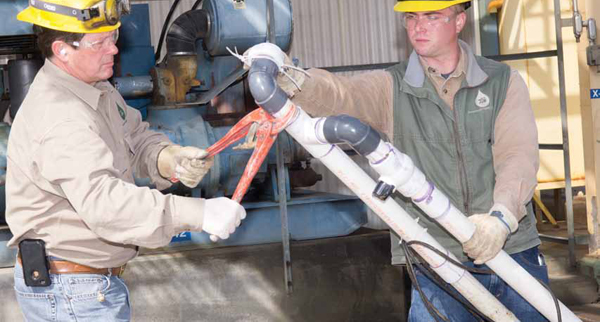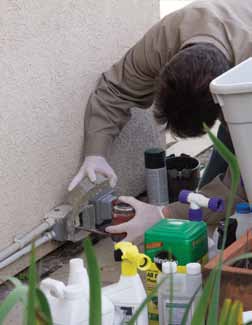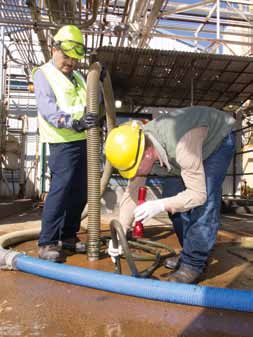
Bugs. Septic tank leaks. Poor food preparation. Bacteria. To most of us, those are words for situations we’d rather not think about or deal with. But Environmental Health Specialties tackles those chores head-on.
The business was started by John Shrader in 1999. Before that, John, who holds a degree in Environmental Science from Lamar University, was with the City of Baytown Environmental Health Department. “They put a lot of hats on my antlers, and after 15 years I decided that it was as good an opportunity as there ever was going to be to step out and take a chance to start a business.”
John’s wife, Susan, is not only John’s life partner, but his partner in business. “We go tmarried in front of the Eiffel Tower. The next day I woke up and said, ‘well, there’s day one,’” John grins. They’ve been married for almost 6,400 days. They celebrate each day together and mark it on a calendar. They have one daughter, Lauren.

“What we do is not necessarily the most glamorous of professions, but it is important,” he says. “Our mission is to help you lead a healthy life.” “We provide an education, along with a service,” Susan announces. “In a long term relationship,” John chimes in. “I want a relationship where you appreciate what I bring to you, that actually means something. It’s not the quick buck that we’re after, it’s a long-term relationship. We literally lose very few customers.”
The territory that John and his assistant, Dustin Stone, cover is roughly a 30 mile circle around Baytown, but they will of course go beyond that. Environmental Health Specialties’ forte includes water well inspection, septic system site evaluation, design, installation and real estate inspection, septic system maintenance, integrated pest management and termite control, food safety training and establishment inspection, and day care and foster home inspections.
“We call it integrated pest management,” John explains. “There’s no eradication. It’s a misnomer. We start off with an inspection, a thorough inspection. Who is here? What pests are we dealing with? Why are they here? What’s attracting them? Is it simple harborage, food? Is it water? Is there a way that they’re getting in? Can we physically change any of that so that it’s less attractive?” “Examples of attractions to pests would include leaving your pet food or water out all the time; that’s a rodent attractant,” Susan adds.
John doesn’t like using pesticides anymore than he must because he’s cognizant of the environment being for the welfare of the occupants and not the pests. He follows a treatment by monitoring the situation. “One of my favorite tools in my bags is glue traps. They’re disposable. They get full of cat hair, you throw them out. If they catch a mouse, throw it out. If there’s a couple of silverfish or a roach, now I know who is here and why. You’re happy because you didn’t see them run across the floor. We’re happy because we didn’t use pesticides.”
The types of commercial clients that John sees range from schools, paint and body shops, transportation companies, petrochemical companies, to restaurants and office buildings that use their different types of services.
Many customers that need septic tanks have a problem with leaks. “If you’re getting ready to buy a property that has septic on it, let us look at it before you buy the property,” John advises. One of the problems with the soil in our area is due to our high water table and the small-particle, tight clay. “Because the clay is small, there’s no space between, and with old septic systems you need that water to ooze out into the soil.” John likens the clay in our area to a glass of water that’s almost full. “Once we get these heavy rains, the clay swells and all those little voids that are little already, they are full of water. Once you fill that glass up, the rest of it is coming out somewhere, either out in the yard or in your house.” Environmental Health Specialties can make sure that the septic systems run smoothly by making sure that toilets flush well. If not, they can then determine what the reason is, whether it’s a toilet paper clog or solids have blocked the line in the tank, or if there’s a mechanical issue in the system. “Rainwater infiltration is huge,” John attests.

An experiment that one can do at home to see if their toilet water is running is to pour a little bit of Comet or baking soda around the edge of the waterline inside the toilet bowl. If the Comet or baking soda streaks downward, then that’s a sure sign of the toilet running. “A leaking toilet can waste hundreds or nearly 10,000 gallons a day on a commercial toilet,” John warns. “We have low-flow toilets these days, but if that valve is open, it isn’t a low-flow toilet anymore,” he points out.
“With any septic, it doesn’t matter, aerobic or otherwise, it’s a natural process. Things you wouldn’t eat, you don’t want to put in them,” John instructs. “If it’s bad for you, it’s bad for the system.” John further warns that if one throws something in that’s marketed for septic systems, it could adversely affect the balance of the system and could cause problems.
There’s a new species of ant called the Raspberry Crazy Ant, or RCA. John was concerned that this new type of ant had invaded one of his customers, who called him last month to check on an ant problem she thought she might have. “We get there [to the house] and she says, ‘I made a carrot cake the other day with white icing and my son left it out on the countertop, and when I got up the next morning, it was black!’”John relates. “She says, ‘I don’t put chocolate icing on a carrot cake!’ They were Raspberry Crazy Ants that had literally covered the cake. The cake was black!” Needless to say, John treated the home for RCA’s ants. Cleaning and sanitation is part of the integrated pest management success.
“The principles of food safety apply to everyone, be a mother, a husband, a father, whoever’s preparing food and eating food, we’re all susceptible to it. It all comes down to safe food handling practices,” John explains. The owner of Environmental Health Specialties likes to explain to his customers the reasons behind what’s going on. “I like to teach why, more so than what. If I can tell you why and you can see that picture, then it becomes tangible to you. Tie it to an old myth: ‘I ate too much pie, so I got sick.’ Well, no, you more than likely ate some pie that sat out too long at room temperature, something contaminated it that grew; that’s what got you sick. It’s a bacteria or virus, a parasite or a toxin. All of these are naturally occurring. Did I allow a growth that gets us sick? I like to teach why things are important.”
Educating people has been part of John’s modus operandi since he’s been in the profession. On occasion, he takes on established rules of conduct, if he feels it will improve the health of society. “Ten years ago I began to try to stimulate a change in the culture of dining. Here’s the premise of things. If I ate at your home, it’s very likely that I would get up after dinner and help clean the table. I might even do the dishes with you. That’s courteous. If I go to a fancy restaurant, I’d have my meal and say thank you. I’d pay for my meal and my tip and I walk out the door. What do you do when you eat at a fast-food restaurant?” People customarily pick up their trays or meal wrappers after eating at a fast- ood restaurant and throw the refuse in the trash receptacles. John would rather see the patron not pick up his tray and wrappers, but leave them on the table. “I’m trying to change that in our culture.”
John points out that the restaurant is required to provide its patrons with a safe and sanitary environment. “We’ve been conditioned as customers to think that we’re supposed to pick up after ourselves as a courtesy to the next diner.” John states that doing so is a disservice to the next diner, because the table doesn’t get cleaned off. If the table isn’t disinfected, the microorganisms that cause illness are still present. He wants people to shift their thinking in not picking up after themselves, even though they will be looked down upon by both the other patrons and restaurant employees. It’ll be a hard job to recondition people’s behavior, but John has a point. Fast-food restaurant tables aren’t disinfected after each diner leaves.
Teaching, or reconditioning people’s way of thinking, is forever important to John. The business is located conducted where you live and work. Their phone number is 281-428-2648. Their website is www.EHSpecialties.com. “We make this world a little better in everything we do,” John states. Environmental Health Specialties makes this world a little bit cleaner with each project they perform. John has been at the helm of his business, making the world a little better, for over 5,100 days.

